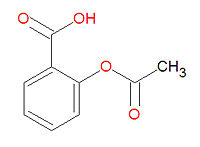Aspirin
Aspirin, or acetylsalicylic acid, is the "prototypical analgesic used in the treatment of mild to moderate pain. It has anti-inflammatory and antipyretic properties and acts as an inhibitor of cyclooxygenase which results in the inhibition of the biosynthesis of prostaglandins. Specifically, it inactivates the enzyme prostaglandin synthase by acetylating its terminal amino group. Aspirin also inhibits platelet aggregation and is used in the prevention of arterial and venous thrombosis."[1] Aspirin is a non-steroidal anti-inflammatory agent, often abbreviated as NSAID.
Aspirin resistance may cause susceptibility to cardiovascular morbidity.[2]
Aspirin resistance
Individuals in whom platelet function assays demonstrate resistance to aspirin are less likely to have cardiovascular protection from aspirin or other antiplatelet treatments.accompanied by rhinorrhea[3] As many as 28% of patients are resistant to aspirin.[4]
Apparent resistance may be due to inadequate patient compliance, especially in the setting of polypharmacy.[5]
Asthma, Nasal Polyps, and Aspirin Intolerance
Among patients with asthma, 10% to 20% may have bronchoconstriction accompanied by rhinorrhea.[6]
External links
- Aspirin - FDA approved drug information (drug label) from DailyMed (U.S. National Library of Medicine).
- Template:MedMaster
- Template:DrugBank
References
- ↑ Anonymous (2024), Aspirin (English). Medical Subject Headings. U.S. National Library of Medicine.
- ↑ Krasopoulos, George et al. 2008. “Aspirin "resistance" and risk of cardiovascular morbidity: systematic review and meta-analysis.” BMJ 336(7637):195-198. http://www.bmj.com/cgi/content/full/336/7637/195
- ↑ Krasopoulos G, Brister SJ, Beattie WS, Buchanan MR (2008). "Aspirin "resistance" and risk of cardiovascular morbidity: systematic review and meta-analysis". BMJ 336 (7637): 195–8. DOI:10.1136/bmj.39430.529549.BE. PMID 18202034. Research Blogging.
- ↑ Online Mendelian Inheritance in Man, OMIM®. Johns Hopkins University, Baltimore, MD. MIM Number: 608223. World Wide Web URL: http://omim.org/.
- ↑ Pignatelli P, Di Santo S, Barillà F, Gaudio C, Violi F (October 2008). "Multiple anti-atherosclerotic treatments impair aspirin compliance: effects on aspirin resistance". J. Thromb. Haemost. 6 (10): 1832–4. DOI:10.1111/j.1538-7836.2008.03122.x. PMID 18680540. Research Blogging.
- ↑ Online Mendelian Inheritance in Man, OMIM®. Johns Hopkins University, Baltimore, MD. MIM Number: 208550. World Wide Web URL: http://omim.org/.
